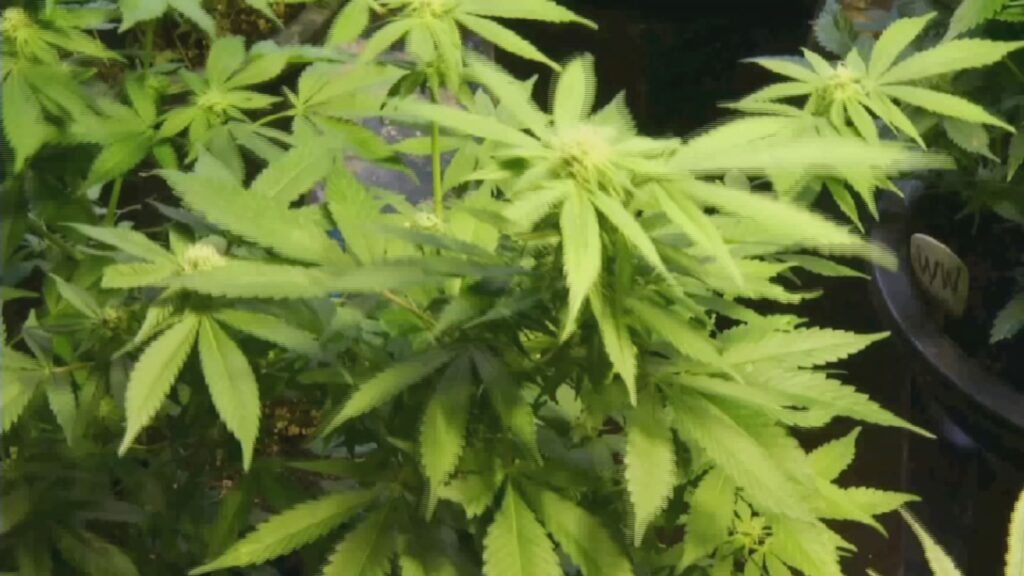Legalizing marijuana has been promoted as a way to stamp out the illicit market in states across the country while maximizing tax benefits for local economies, but an NBC 10 I-Team investigation found the illegal market, also known as the legacy market, is still very much alive.
Records requests sent to police departments across the South Coast uncovered that while marijuana arrests have dropped in some cities and towns, they’ve remained stagnant in others nearly five years after recreational pot shops opened for business in Massachusetts.
Taunton had more possession with intent to distribute arrests the year after pot shops opened than before, reporting none in 2018 and five in 2019. They haven’t had any since.
Commercial sales of recreational marijuana in Massachusetts has reached $2.54 billion, according to the Cannabis Control Commission. (WJAR)
Dartmouth saw a decline during the pandemic with no cases in 2020, but arrests have since rebounded since then with three in 2022 and three in 2023, which are comparable to 2019 numbers.
In Attleboro and South Attleboro, marijuana related distribution arrests have plummeted from 18 in 2018, to four from 2019 to 2020, and two from 2021 to 2023.
Arrests connected to marijuana distribution and intent to distribute fell by about 75% in Fall River last year after remaining steady from 2018 to 2021.
Despite the dramatic drop off, Fall River Police Sgt. Moses Pereira doesn’t think it’s related to legalization. “I think it’s more of a coincidence,” he said.
Pereira cites an officer shortage that has increased over the past five years.
“At the time we had a lot of staff in the vice and intelligence unit, we had more detectives who were focusing on different types of drugs,” he said. “As we have begun to feel the brunt of retirements and officers leaving the department, we have unfortunately had to transfer officers to the uniform division so they can focus on the day-to-day operations of the department.”

Pereira also says the officers who do focus on drugs are concentrated on the raging opioid epidemic, which continues to cause an unprecedented amount of overdose deaths.
While the illicit market still exists, Pereira believes it has likely changed a lot since recreational dispensaries opened in 2018.
“Before the legalization of marijuana and the implementation of recreational marijuana facilities, everyone essentially had to seek out the black market,” he said. “The black-market dealers are probably seeing customers who are under 21, customers were may not be willing to go in public to a recreational marijuana facility.”
While there are no hard numbers for the illicit marijuana market, Pereira doesn’t believe it has changed much. Instead, it’s likely catering to a younger crowd.
“It’s always hard to quantify when it comes to the black market because you can never put a number on how many dealers you have on the streets, how many are selling from home,” he said. “But I would say the activity remains probably the same.”
Massachusetts Cannabis Control Commissioner Ava Callendar Conception disagrees that recreational marijuana hasn’t made a dent in the illicit market.
“Our numbers indicate that there’s been an increase in sales and customers who are going to regulated cannabis retailers,” Callendar Conception said.
Similar to police, the CCC doesn’t have data on the illegal market, but they do keep a close eye on the legal market in Massachusetts.
A CCC survey shows 76% of cannabis products were purchased legally in 2021 compared to just 56% in 2019.

Recreational sales in June in Massachusetts topped $132.8 million, the highest single month of adult-use sales since the regulated market opened.
There’s no way of knowing where the additional sales came from, but Callendar Conception believes it could indicate more customers are moving away from the unregulated market.
“I don’t know if the legacy market will ever be completely stamped out, but we can make it less appealing,” she said. “Unlike the illicit market, our products are tested. That’s one of those major things that sets us aside.”
The regulated market in Massachusetts has recently seen an increase in retail options, which has decreased prices for consumers.
The state has also passed legislation to help workers transition from the illicit market into the legal market, something that previously wasn’t possible due to regulatory barriers.
“A part of that new law now allows people to be employed here, who otherwise would not be employable in cannabis for doing cannabis related offenses,” Callendar Conception said.
The law states that a prior criminal conviction will not disqualify someone from working in a marijuana establishment unless the offense involved drug distribution to a minor. “You can’t expect us to really curtail that kind of legacy market without offering some sort of avenue,” Callendar Conception said.
A CCC survey from 2021 found high prices were still driving people to the illicit market, but prices have dropped drastically since then.
At the time, cannabis cost about $13.61 a gram. That price has since dropped over 55% to $6.05.
Other factors preventing customers from entering the regulated marijuana market in that survey include stores being less convenient, too far away, dealer loyalty, a lack of anonymity, and stores requiring identification.
H/T: turnto10.com




